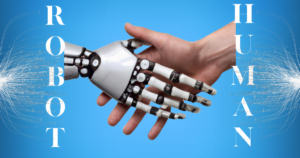
Artificial Intelligence is a rapidly advancing technology that aims to simulate human intelligence in machines. Its impact on various industries worldwide has revolutionized processes and operations across sectors. In healthcare, artificial intelligence is being used for disease diagnosis, personalized treatment plans, and drug discovery. In finance, AI algorithms are enhancing fraud detection, risk assessment, and trading strategies. In manufacturing, AI-powered automation is streamlining production lines and optimizing supply chains. In retail, AI is improving customer experiences through personalized recommendations and chatbots. Overall, AI is reshaping industries by increasing efficiency, productivity, and tech innovation, leading to significant advancements and opportunities for growth in the global economy.
Artificial Intelligence is significantly impacting the job market and development landscape in India by creating new job opportunities that require skills in AI, data science, and machine learning. The demand for professionals with expertise in AI technologies is driving growth in specialized training programs and courses, opening up job opportunities across various industries. Machine learning is shaping the job market by automating routine tasks, increasing efficiency, and fostering innovation, thereby positioning India as a hub for AI development and research. However, concerns about job displacement due to automation underscore the importance of upskilling and reskilling initiatives to seize the emerging job opportunities in the evolving AI-driven economy.
Artificial Intelligence Adoption in India
AI adoption in India is steadily increasing across industries, with sectors such as healthcare, finance, e-commerce, and manufacturing embracing machine learning technologies to drive efficiency and tech innovation. The current state of AI adoption in India showcases a growing interest in leveraging AI for data analytics, customer insights, and process automation. Businesses are recognizing the growth potential of AI in enhancing decision-making processes, improving customer experiences, and optimizing operations. This tech innovation is creating opportunities for businesses to gain a competitive edge and creating job opportunities to explore important roles in AI development, data science, and AI strategy. As AI continues to revolutionize the business landscape, investing in AI capabilities can unlock new possibilities for growth and success in the rapidly evolving tech-driven economy.
Impact on the job market:
Artificial intelligence is reshaping traditional job roles by automating repetitive tasks, leading to the creation of new career opportunities in AI development, data science, and machine learning. As AI continues to advance, the future workforce will need to acquire skills such as programming, data analysis, critical thinking, and problem-solving to thrive in AI-driven environments. Embracing these skills will open up job opportunities in emerging fields such as AI ethics, AI strategy, and AI implementation, shaping the job market for a tech-driven future.
Artificial intelligence in development projects
Ai is revolutionizing development projects in India by integrating technology innovation into sectors like healthcare, agriculture, and education. In healthcare, AI is being used for early disease detection and personalized treatment, leading to improved patient outcomes. Similarly, in agriculture, AI-powered solutions are enhancing crop yield predictions and soil management practices. In education, machine learning is enabling personalized learning experiences and improving student performance through adaptive learning platforms. These tech innovations are driving efficiency and innovation in these sectors, showcasing the immense potential of AI to transform and optimize development projects in India.
Challenge and opportunities
Integrating Artificial intelligence into the Indian job market and development projects presents both challenges and opportunities. One of the key challenges is the potential impact on employment, as AI automation may lead to job displacement and increased unemployment in India. However, this also opens up job opportunities for upskilling and reskilling the workforce to take on new roles in AI development, data analysis, and tech-related fields, creating job opportunities in emerging sectors. By addressing the skills gap and investing in machine learning education and training programs, India can harness the potential of AI to drive job opportunities and economic growth. While concerns about unemployment in India persist, strategic planning and investment in AI technologies can pave the way for a future where job opportunities in tech-driven industries flourish, shaping a more resilient and innovative workforce.
Conclusion
In conclusion, the blog post highlighted the significant impact of artificial intelligence in fostering job growth and development in India. By leveraging AI technologies, various industries in the country are experiencing transformative changes that are creating new job opportunities for employment and economic advancement. The integration of AI in sectors such as healthcare, agriculture, finance, and manufacturing is not only enhancing efficiency but also opening doors to tech innovation roles and skill requirements.
Readers must recognize the transformative potential of artificial intelligence and stay informed & updated about the evolving landscape of tech innovation and different skills in India such as digital marketing, data analysis, stock market investing, risk management, sales, accounting, etc… By adapting to these changes and acquiring relevant skills, individuals can position themselves for success in the AI-driven job market. Embracing machine learning advancements and being proactive in learning about its applications will be key in navigating the future job market, and new job opportunities and contributing to the continued growth and development of India’s economy.



